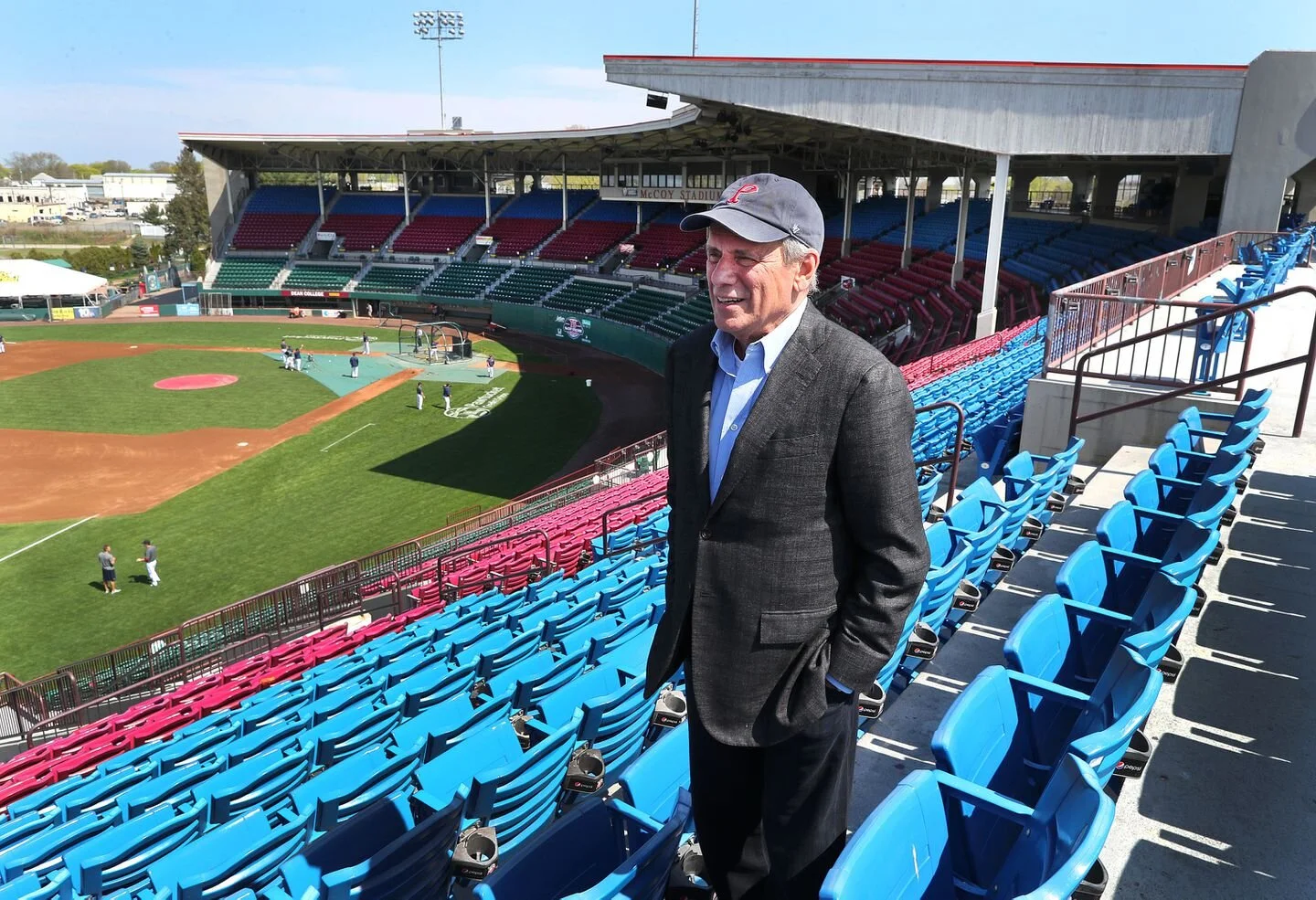By Jon Chesto
Image by John Tlumacki
August 18, 2018
WORCESTER — Ending a protracted search for a new home, the Pawtucket Red Sox said Friday that they had signed a deal to move to Worcester, ending an era for the minor league affiliate in Rhode Island that dates back to 1973.
PawSox chairman Larry Lucchino said the team signed a letter of intent with the city to build a nearly $90 million, 10,000-seat stadium that would be open for baseball in 2021. He will once again partner on the stadium project with Janet Marie Smith, with whom he worked on the construction of Oriole Park at Camden Yards and renovations to Fenway Park when the two worked for the Boston Red Sox.
“We look forward . . . to having a hell of a ride with Worcester,” Lucchino told a crowd gathered at City Hall to herald the deal.
The team will be renamed the Worcester Red Sox and the stadium will be called Polar Park, after hometown beverage maker Polar Beverages, which struck a deal for the name. Lucchino said WooSox is one possibility as a nickname.
Located on an empty site once occupied by metal parts maker Wyman-Gordon in Worcester’s Canal District, the stadium would be owned by the city, which would borrow $100 million to finance construction. The bonds would be paid
off by rent from the team, and from a special taxation district the city would establish to capture tax revenue at the ballpark and nearby properties.
The state would provide $32.5 million in assistance for infrastructure improvements, and another $2.5 million in housing tax credits that would assist the broader redevelopment that is part of the stadium project. Developer Denis Dowdle, of Madison Properties in Boston, plans to build a mixed-use project with two hotels, apartments, restaurants, and shops, just south of the ballpark within the 18-acre taxation district.
Worcester and state officials also pledged to fix nearby Kelley Square, one of the most congested intersections in the city. The move is subject to league and local approvals, including a city council vote that’s needed for the arrangement with the team.
The decision is a blow for Pawtucket, a struggling city that was recently hit by the closure of Memorial Hospital. Toy company Hasbro has been mulling whether to renovate its headquarters in the city or to relocate, perhaps to Providence. McCoy Stadium in Pawtucket dates back to 1942, and it hosted countless Red Sox stars of the future since the Triple A affiliate began playing there in 1973. It was the location of professional baseball’s longest game, a 33- inning affair against the Rochester Red Wings in 1981 played over two days.
Though updated over the years, McCoy lacks the amenities sought by a new ownership group that took over in 2015 and included Lucchino, then-chief executive of the Boston Red Sox. Many in the area fondly recall McCoy Stadium as a place of family nights, Little League outings, and cheap dinners of hot dogs and soda. Steven and Dawn Porter, who own a bookstore in Pawtucket, said the city is losing a crucial piece of its identity.
“It’s a big fish for Rhode Island to let go of,” Dawn Porter said.
Officials in Rhode Island had made multiple efforts over the years to keep the team in the state. Most recently, Pawtucket Mayor Don Grebien pushed for a new stadium at the site of the old Apex department store building along the Blackstone River, part of his broader effort to revitalize the city’s downtown. That plan hinged on an $83 million financing plan, but the measure passed by Rhode Island’s General Assembly in June failed to include a state backstop for the bonds. Lucchino said the lack of that in Rhode Island caused significant uncertainty in the project’s overall financing costs, and was a key reason for considering Worcester.
Grebien issued a statement bemoaning the team’s departure, saying that secret negotiations and “substantial subsidies” from Worcester and the state of Massachusetts led to the decision to rip the team “out of its rightful home.”
“The PawSox do not make Pawtucket,” Grebien said. “Pawtucket made the PawSox.”
For Worcester, New England’s second-largest city, luring the PawSox is another step forward in its revival. But the stadium doesn’t come without risk: the city has agreed to guarantee the construction debt, meaning it will assure bondholders it can cover any shortfalls if necessary. But Worcester officials say they’re not worried. About $30 million of the bonds would be directly covered by the team’s rent, amounting to roughly $1 million a year. And city officials say conservative projections show that parking revenue, hotel taxes, advertising sales, and other revenue in the new district would easily cover the rest of the debt payments.
“The project is premised on the concept that the development will be self- supporting,” Worcester City Manager Edward Augustus said. “In essence, the project pays for itself.”
No one mentioned 38 Studios, the failed computer game company that former Red Sox pitcher Curt Schilling once ran, during the Friday event in Worcester. But its legacy had an impact, because of the millions in state loan guarantees that had been promised to the company by Rhode Island officials. 38 Studios fell apart in 2012, and its failure regularly came up in discussions in Rhode Island as PawSox advocates tried to build public support for a deal.
Lucchino was brought into the PawSox by Jim Skeffington, a Providence power broker and longtime legal adviser for the Boston Red Sox. Skeffington wanted a new waterfront stadium in Providence, but he died soon after the team’s 2015 purchase, prompting Lucchino to take a more active role in promoting the Providence option. Lucchino later pulled the plug on that idea, after critics raised concerns about subsidies. Lucchino and other PawSox executives said their initial preference would have been to stay in Rhode Island, and they only began negotiating with Worcester a year ago. By that time, Lucchino already had received thousands of postcards signed by Worcester-area residents who urged the team to relocate.
Rhode Island House Speaker Nicholas Mattiello, who resisted including the state guarantee in the PawSox legislation, expressed disappointment at the PawSox move. In a statement, he pointedly noted the state plan required the
team, not Rhode Island taxpayers, to shoulder any risks associated with the stadium.
“It is disheartening the PawSox did not show the same loyalty to the City of Pawtucket and the State of Rhode Island as the taxpayers and fans have shown to them for many decades,” Mattiello said.
Worcester’s history as a baseball town came up several times during the event at City Hall. The first perfect game in major league history was thrown there, in 1880. It is believed to be the scene of the famed “Casey at the Bat” poem by Ernest Thayer. Ted Williams hit his first home run in a Red Sox uniform at a Worcester college ballfield. And a local Little League sent a team to the US finals of the Little League World Series in 2002.

